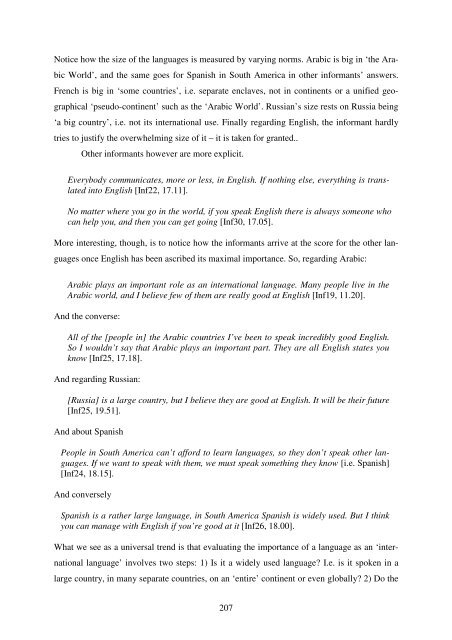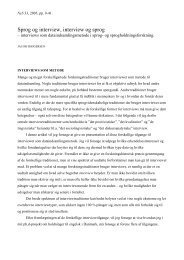Hør dog hvad de siger - Note-to-Self: Trials & Errors
Hør dog hvad de siger - Note-to-Self: Trials & Errors
Hør dog hvad de siger - Note-to-Self: Trials & Errors
You also want an ePaper? Increase the reach of your titles
YUMPU automatically turns print PDFs into web optimized ePapers that Google loves.
Notice how the size of the languages is measured by varying norms. Arabic is big in ‘the Ara-<br />
bic World’, and the same goes for Spanish in South America in other informants’ answers.<br />
French is big in ‘some countries’, i.e. separate enclaves, not in continents or a unified geo-<br />
graphical ‘pseudo-continent’ such as the ‘Arabic World’. Russian’s size rests on Russia being<br />
‘a big country’, i.e. not its international use. Finally regarding English, the informant hardly<br />
tries <strong>to</strong> justify the overwhelming size of it – it is taken for granted..<br />
Other informants however are more explicit.<br />
Everybody communicates, more or less, in English. If nothing else, everything is translated<br />
in<strong>to</strong> English [Inf22, 17.11].<br />
No matter where you go in the world, if you speak English there is always someone who<br />
can help you, and then you can get going [Inf30, 17.05].<br />
More interesting, though, is <strong>to</strong> notice how the informants arrive at the score for the other lan-<br />
guages once English has been ascribed its maximal importance. So, regarding Arabic:<br />
Arabic plays an important role as an international language. Many people live in the<br />
Arabic world, and I believe few of them are really good at English [Inf19, 11.20].<br />
And the converse:<br />
All of the [people in] the Arabic countries I’ve been <strong>to</strong> speak incredibly good English.<br />
So I wouldn’t say that Arabic plays an important part. They are all English states you<br />
know [Inf25, 17.18].<br />
And regarding Russian:<br />
[Russia] is a large country, but I believe they are good at English. It will be their future<br />
[Inf25, 19.51].<br />
And about Spanish<br />
People in South America can’t afford <strong>to</strong> learn languages, so they don’t speak other languages.<br />
If we want <strong>to</strong> speak with them, we must speak something they know [i.e. Spanish]<br />
[Inf24, 18.15].<br />
And conversely<br />
Spanish is a rather large language, in South America Spanish is wi<strong>de</strong>ly used. But I think<br />
you can manage with English if you’re good at it [Inf26, 18.00].<br />
What we see as a universal trend is that evaluating the importance of a language as an ‘inter-<br />
national language’ involves two steps: 1) Is it a wi<strong>de</strong>ly used language? I.e. is it spoken in a<br />
large country, in many separate countries, on an ‘entire’ continent or even globally? 2) Do the<br />
207



